Continuing Education In Health And Fitness: The Pros And Cons Of 7 Different Learning Formats (Plus How To Choose Which Is Right For You)
++
Whenever choosing one type of continuing education to invest in—from books to courses to seminars—you lose the opportunity to invest in another. At least for now. That’s why health and fitness pros must make better continuing education choices. Here’s how.
++
In my last article—What Ernest Hemingway Can Teach You About Choosing Your Next Health And Fitness Course—I helped you plot out a T-shaped learning curriculum, the fastest path from today you to future you.
Hopefully, if you followed the steps I outlined, you now know which domains you want (and need) to receive more training in. If so, it’s time to consider how you’ll gather that training.
Specifically, it’s time to choose which learning formats are best for you.
Before starting, however, it’s important to remember that—just like everything else in life—the educational choices you make have trade-offs.
All Things In Life Come with Trade-Offs
Say you want to get married.
If so, marriage will probably help you increase the amount of intimacy and companionship in your life. That’s great! However, you might have to trade some independence for those benefits.
Might as well stay single, right?
Not so fast. While staying single will probably allow for more independence in your life, you might have to trade companionship and intimacy for that independence.
In other words, there are some clear trade-offs whether you decide to get married or stay single. Neither option is all good or all bad. And, when choosing from the two, it’s up to you to weigh the pros and cons to determine whether those trade-offs are right for you.
The same is true with everything else, including continuing education. Choosing to take a weekend seminar offers certain benefits. But that choice also means you’re not able to spend that same time and money on reading a textbook, taking an online course, or getting mentorship.
That’s why I created this article.
To help you better understand the pros and the cons of the seven most popular continuing education formats—as well as the trade-offs of each.
I’ve even created a ranking system based on the following criteria:
- Ease:
0 represents education that’s difficult to consume
10 represents education that’s easy to consume - Affordability:
0 represents education that’s expensive or very high cost
10 represents education that’s free or very low cost - Contextually relevant:
0 represents education that’s given out of context
10 represents education that’s put in its proper context - Skill building:
0 represents education that’s more theoretical in nature
10 represents education that will help you build practical skills - Credentials:
0 represents education that will give you no credentials
10 represents education that will give you maximum credentials - Career value:
0 represents education that won’t make a difference in your career
10 represents education that will make a difference in your career
Education Format #1:
Articles in magazines, journals, trade publications, or online
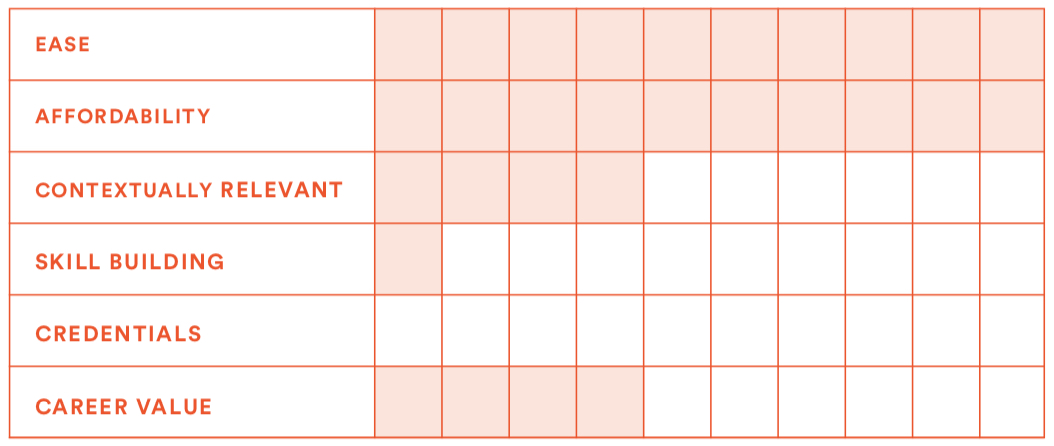
With publications for every interest and profession, plus an explosion of online publications catering to every sub-niche within every niche, articles are everywhere!
If you’ve found a trusted, honest, authoritative source, their ease of access and cost is hard to beat. In addition, articles can be published quickly in order to deliver cutting-edge, timely information.
This is why so many people read articles online as part of their personal and professional education.
However, since articles are designed to be short and specific, they don’t always help you orient what you’re learning in its proper context, within the larger field of knowledge. (This even includes scientific articles).
In addition, not all articles are equally authoritative and credible. Plus, articles rarely help you develop practices that reliably lead to new skills.
So choose wisely. Also remember that if you spend all your personal development time reading articles, you won’t have time left over to develop the skills you’ll need in your daily practice.
Reading doesn’t produce the same kind of learning as doing.
Education Format #2:
Books and e-books
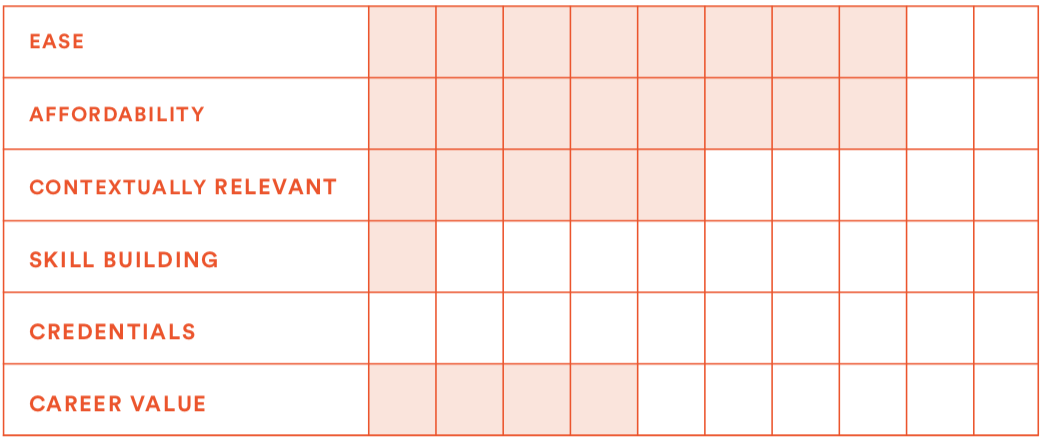
Once upon a time, having a published book was a marker of authority and credibility because books could only be published through a small group of information gatekeepers (i.e. publishing houses).
This made publishing more difficult for individuals but it largely helped protect readers from unqualified authors and fraudulent information.
Nowadays, the gatekeepers are gone.
Traditional book publishing decisions are driven primarily by the likelihood that a book will sell and not necessarily by a book’s trustworthiness or credibility. Plus, self-publishing requires no permission or review whatsoever.
So buyer beware. Just because someone’s written a book doesn’t mean that the book is original, valuable, or useful.
With that said, good books, written by trustworthy and believable authors, can deliver valuable information set in its proper context. As books are usually 10-20 times the length of articles, they can allow deeper exploration of particular topics. And, while books almost never produce transformative change on their own, they often do introduce us to new ideas that, explored more deeply in other learning formats, can lead to transformation.
Because they require a sizeable time investment (days, weeks, or months depending on how much time you devote to reading) and still aren’t particularly oriented to skill development, make sure you’re clear on what you need most before picking up a new book: more information about a topic you know little about or more practice doing what you already “know” but haven’t implemented.
Education Format #3
Free online videos, lectures, podcasts
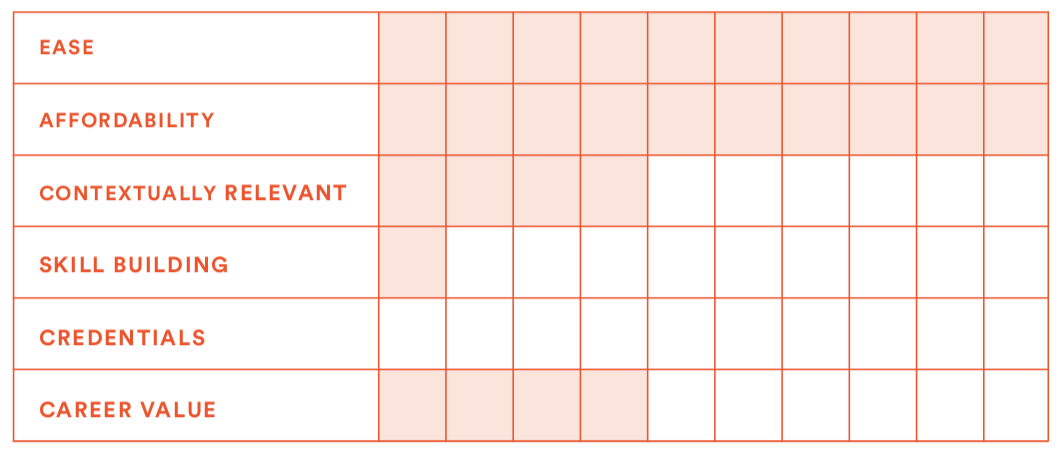
I rate free online videos, lectures, and podcasts similarly to free articles as they share some of the same pros (inexpensive, easy to consume) and cons (lacking context, low on skill development unless they offer exercises for you to do at home).
Similar to articles and books, the lack of credibility gatekeepers means you have to be very diligent in finding trusted, authoritative, and honest sources who base their work on a balanced review of the research (vs agenda-driven opinion pieces).
As with both articles and books, since video content is ubiquitous, cheap, and easy to consume, it’s important not to mistake consumption for progress, especially if you require skill development even over information gathering.
Education Format #4
Live seminars (paid)
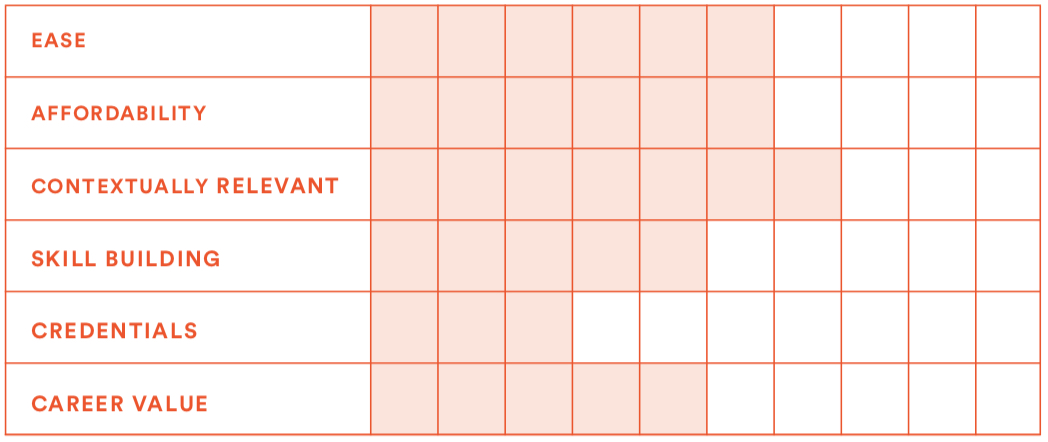
Weekend seminars in the form of summits (multiple speakers delivering 30-90 minute presentations on a variety of topics) or workshops (single speakers delivering 1-2 days on a specific topic) are popular in the health and fitness industry. Depending on the quality of the event and the speakers, attendees usually come home with a mix of new information, new things to try, and (sometimes) hands-on experience.
Workshops often allow us to explore a particular topic in depth, as well as interact with subject-matter experts. This means you might find that the content more closely meets your specific needs and interests than what you’d get in books, articles, and online videos.
However, the value of these events has to be weighed against the time commitment, cost (of travel + event fees), and usefulness at the present stage of your career. For example, an advanced program design workshop for athletes, while interesting for certain personal trainers, may not be relevant if most of their clients are recreational exercisers. Similarly, if a functional medicine doctor’s main limiting factor is getting clients, another biochemistry workshop might have to come later.
Often, the real value in attending live events is getting to meet people. Attending a one hour talk on nutrition for seniors will probably be less instructive than reading a book on the subject by the same author. However, having the chance to interact with the author, and with others interested in the same topic, could help expand your network or simply help you connect with other like-minded professionals.
As most experienced conference-goers know: The best conversations happen during the coffee breaks.
Education Format #5
Certification programs
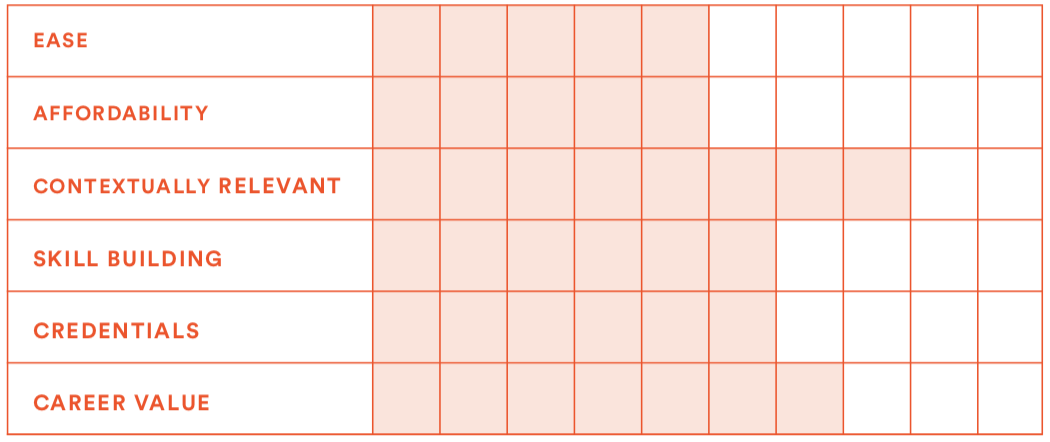
Certification programs in health and fitness give professionals the chance to not only learn a tremendous amount about a particular subject, but also to earn a credential in the chosen area. For example, earning a pre- and post-natal certification demonstrates that you’ve passed the minimum standards required to work with women before, during, and after pregnancy.
In addition, well-done certification programs do an excellent job of surveying the entire field of knowledge, reviewing all the available research, and helping to place the information in its relevant context. For example, a well-done nutrition certification program will help you figure out exactly how a low carbohydrate diet works biochemically, who it might be appropriate for, who it might not be appropriate for, and when it might (or might not) be appropriate. Compare this to one-sided articles, books, or video lectures from individuals arguing for or against such an approach and you’ll better understand the idea of context here and why it’s so important.
In my opinion, short of degree programs, if you hope to develop fluency in a particular discipline, choosing trusted, balanced, authoritative certification programs offers the best value for your investment. Although the investment of time and money is sometimes significant, if you can afford both, you’ll come away with deeper knowledge, more relevant practice, and a more balanced view than if you’d simply read articles, books, or attended one-off seminars.
Two caveats.
- First, there are a lot of bad certification programs out there. So you’ll want to use the triangulation method to help you separate the good from the bad.
- Second, don’t assume certification always means accreditation or getting hired. For example, without having earned a degree in dietetics, there are some things in nutrition even a certified professional cannot do (i.e. medical nutrition therapy). Also, while many employers do value certain certifications higher when hiring candidates, being certified doesn’t guarantee you’ll get a job or even more clients.
As discussed in a previous article, education is about the internal benefits, not the external ones. And it’s a long-term play, not a short-term one.
Invest in developing your inner game through learning and education and, over time, you’ll become more desirable to employers and clients alike.
Education Format #6
Internships and field experiences
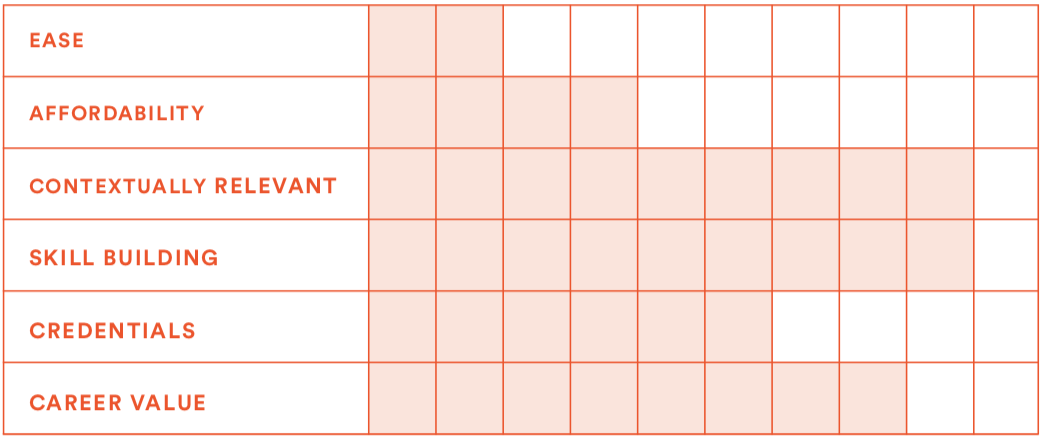
Internships and field experiences done with high profile professionals or with high performing facilities can offer tremendous practical, hands-on, task-relevant skill development. That’s because they require you actually doing the thing vs. just learning about it. (Consider the difference between reading about how to do a deadlift and actually trying your first deadlift).
In addition, internships and field experiences can give you a one-of-a-kind opportunity to see if you actually enjoy the specific work they’re doing. This was particularly huge for me because, at one point in my academic career, I considered becoming a pharmacist. Thankfully I first took a part-time job at a pharmacy, where I learned it wasn’t a good fit for me.
While internships and field experiences can offer a lot of value, they may require you to relocate (at least, temporarily), which could come at a high cost, especially if they’re unpaid internships.
Further, not all internships are created equally. Some are simply poorly structured attempts to get young people doing free labor for the professional or facility, while others are designed beautifully to expose you to all aspects of their practice and walk away with a tremendous amount of practical learning in a short period of time. So evaluate internship opportunities critically.
Education Format #7
Academic programs
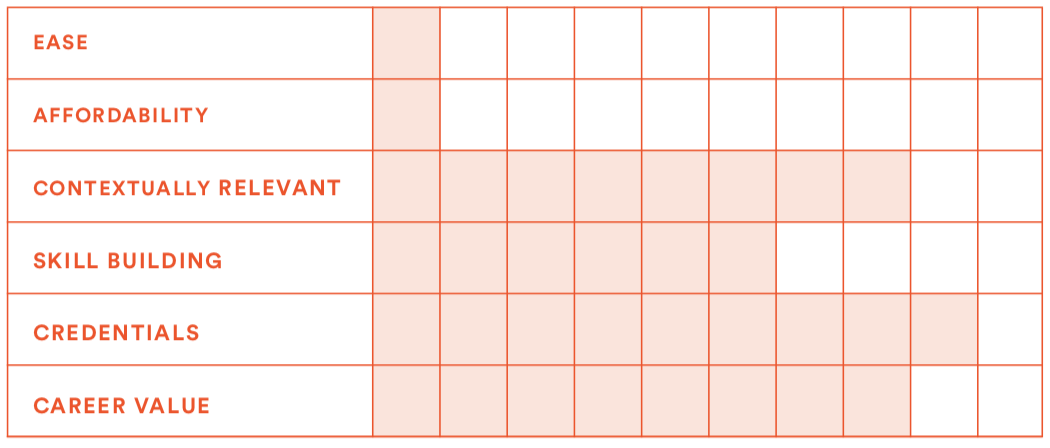
In some occupations, you need a degree to actually practice in the field. (For example, you can’t practice dietetics without having earned a dietetics degree; you can’t practice medicine without having earned a medical degree; you can’t practice chiropractic care without having earned a chiropractic degree.) So, if you’re choosing a health and fitness career that requires a college or university degree, this is a must.
In addition, academic programs with a well-built curriculum usually offer the broadest contextual look at the subject you’re studying (i.e. many courses in different areas of your specialty, including hands-on practicums, taken over many years). These programs can offer a broader understanding of a range of other topics too, including giving you more experience in learning, thinking critically, writing, evaluating ideas, and more.
As great as academic training can be, it can also be extremely time consuming (four years to complete a standard degree program) and expensive (hundreds of thousands of dollars in direct costs plus the opportunity cost of not working for those four years).
In addition, it isn’t always relevant for certain career paths, nor is it likely to help you get a job in others. So do your research to figure out if what you want to do for a living is enhanced by university training (or not).
Bonus Format:
Mentorship
I didn’t include mentors in the learning categories above, nor did I rank it on the criteria above, because I consider mentorship something every professional should have at every stage of their career.
If you’re reading this and you don’t have a mentor today, I urge you to begin looking for one that can help you reach the next stage of your professional journey. Someone who’s thoughtful, experienced, wise. Someone’s who’s just a little further along the path than you are (but not so far along the path that they can no longer relate to the challenges and opportunities before you today).
Wondering how to find one?
In my life I simply keep on the lookout for amazing people I’d like to emulate, people who’ve accomplished some of the remarkable things I’d like to accomplish myself.
(These don’t just have to be professional accomplishments, although they could be. I’m just as excited to learn from someone who has a great family life as I am someone who’s grown a billion dollar business.)
If I get the chance to connect with them, whether by email or in person, I do. And I follow the advice I shared in this article—Building a 5-Star Reputation: Your Step-By-Step Guide to Growing Your Most Important Personal and Professional Asset—showing up as a respectful, grateful, open, compassionate, honest, and curious human. Then I nature take its course.
My friend Nate Green, a master connector who’s been mentored by a who’s who list of interesting and successful people, takes a much more proactive and intentional approach.
Here’s how he thinks about approaching possible mentors, plus some of the strategies he’d recommend for you.
Send the email.
Nate emailed Lou Schuler, the fitness industry’s most well-known journalist, when he was just 19 years old. He proceeded to tell Lou that he wanted his job, asking how he got it.
“It wasn’t my best email,” Nate told me. But Lou surprised him by writing back and offering career advice. “That meant a lot to me. I would have never met him (or many other people who’ve helped shape my career) if I didn’t first reach out.”
Here’s an updated script he recommends if you plan to reach out to a potential mentor via email.
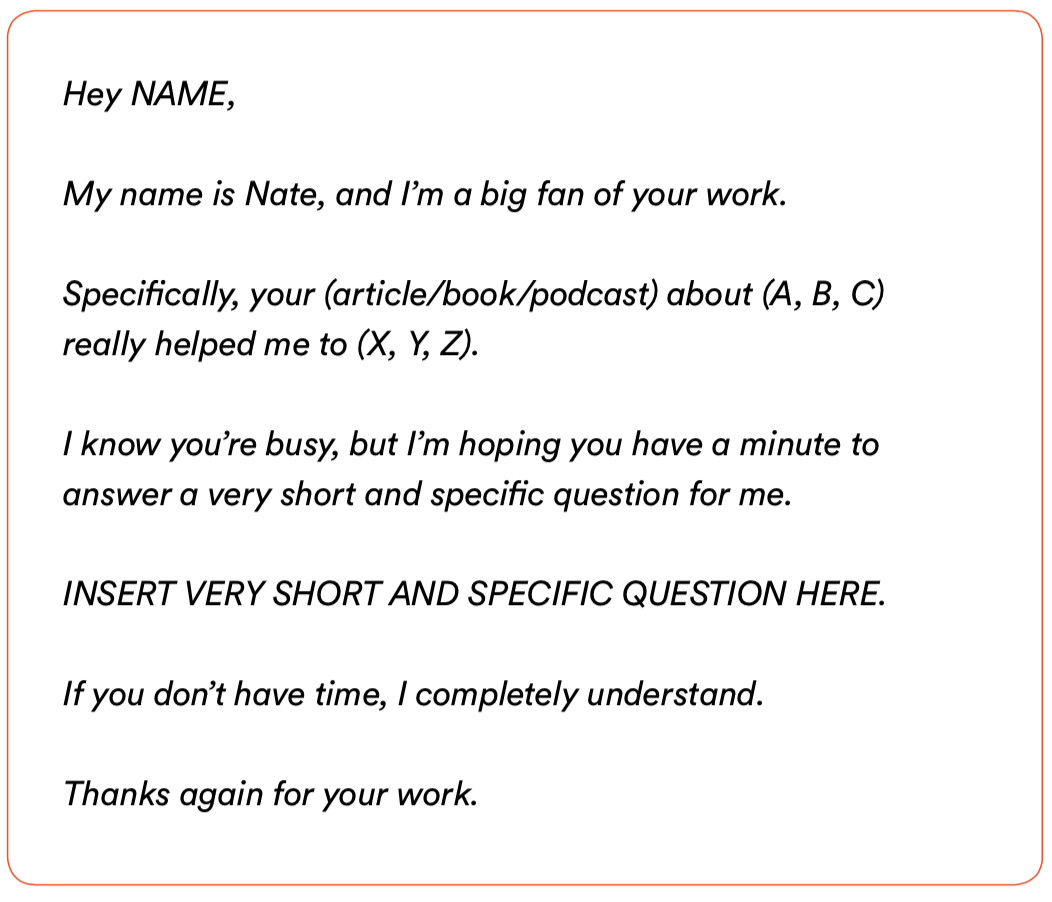
Approach as an equal and not as a fanboy.
Whether you start with an email, or you get the chance to meet a potential mentor in person, make ~5% of the next interaction about how much you love their work. The remaining ~95% is all about talking to them like a friend would. (This works better in person, of course, but applies equally to emailing.)
Nate recommends never fawning over people, hanging around them for too long, or coming across as needy. “It’s like dating that way,” says Nate. “No one wants to hang out with someone who’s constantly like, ‘OH MY GOD I LOVE YOU SO MUCH’ and clings on in a needy way.”
Also, when meeting people in person, never ask to take photos with them. (“It’s too fanboy-ish,” according to Nate.) Yet feel free to bring people small gifts, such as a book you really enjoy and think they’d like too.
Ask if you can follow-up.
If you end up meeting someone at a professional event or social function and have a good initial conversation, Nate recommends asking if you can follow up. Here’s how you can approach the subject.
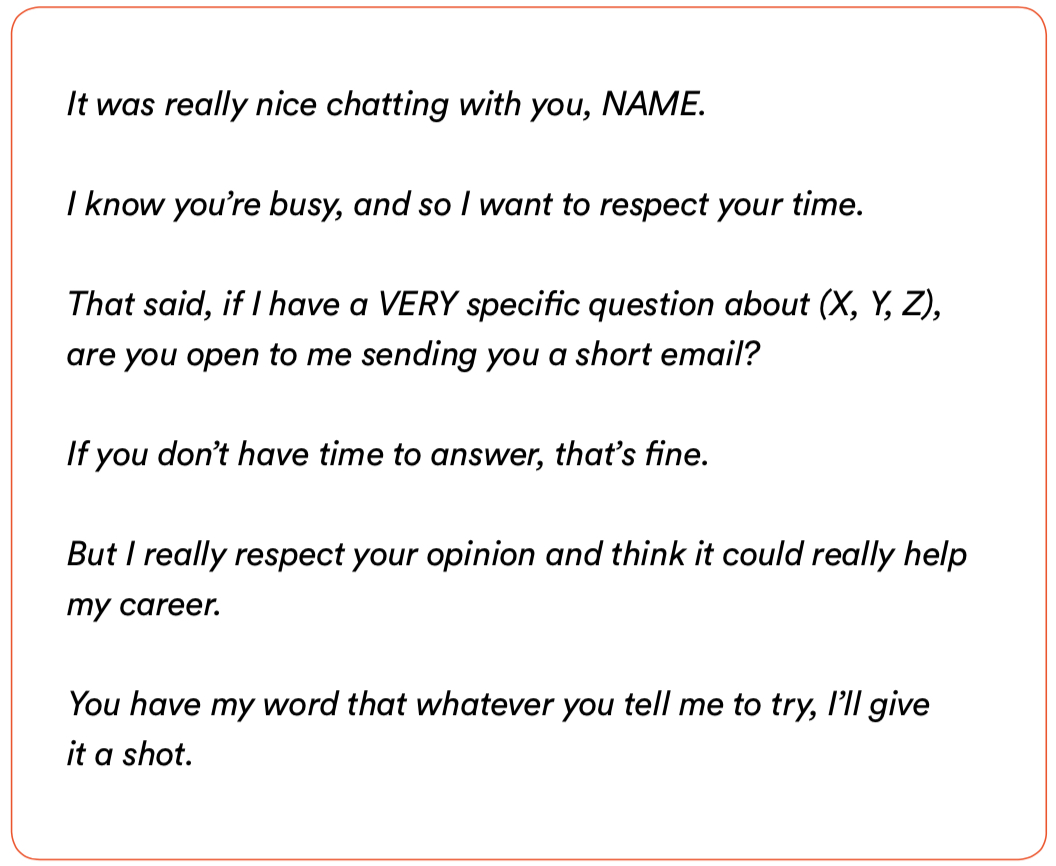
If they say yes,

If they say no,

If they share some advice, take it.
More than gifts or financial rewards, a mentor’s greatest payoff is knowing that a mentee respects their time, takes their help seriously, and isn’t afraid of hard work.
“Let’s say I’m at a conference and meet someone I respect and want to learn from. Maybe we have a 5-minute conversation and they give me a small piece of advice. I write that advice down (later, when I’m back in my hotel room). Then I follow their advice. If they tell me to read a certain book, I read it. If they tell me to should consider starting a blog, I start one.”
Whatever it is, Nate does what they recommended. Later, he tells them about it. “I’ll email to follow-up. Then I’ll ask for a next step, something else they’d recommend I put into action.”
Always be thinking, “What can I offer them?”
You may have zero idea what that is. But it helps to think this way. To constantly be on the lookout for how you can do something, anything, to express your gratitude for their help, guidance, and support.
If you’re wondering why mentors would even spend their time helping you like this, the answer is easy. The right mentors want mentees, badly. They want to share what they’ve learned. And they want to share it with young, smart, curious people who are likely to do something valuable with their advice (and honestly report back on what they did and how it worked out).
And, keep this in mind, they’re not looking to be “impressed.”
Frankly, if you’re mentoring with someone worth learning from, you can’t impress them at your level of development. So you’re not there to be the expert, or to show them how smart you are, or to impose your own limited insights. You’re there to show up with a great attitude and a growth mindset. To listen carefully, ask great questions, and put what you’re learning into action.
Yet, while you’re there to learn, you do get points for being curious, thoughtful, and adding value to the relationship in other ways, for expressing gratitude for the advice and the opportunity.
To this end, I often send my mentors handwritten notes, short reports of how I used their advice to my advantage (as Nate does), and small tokens of my gratitude. I love it when my mentees do the same.
Key Takeaways
Figure out what domains you want to dive deeper into.
Decide what subject areas you want to learn more about and what you want to master. Using a T-shaped curriculum model can help.
Decide on what learning format best meets your needs.
What criteria matters most to you in terms of ease, affordability, relevancy, skill-building, credentials or overall career value? What fits best within the context of your current life and developmental needs?
Find a mentor(s)
No matter what learning opportunities you pursue, having a mentor (or mentors) is non-negotiable. Finding someone just a little further along the path can help you reach the next level of your professional journey.
Want to learn more?
Then check out Dr John Berardi’s one-of-a-kind book – winner of the 2021 Axiom Business Book of the Year – Change Maker: Turn Your Passion For Health and Fitness into a Powerful Purpose and a Wildly Successful Career.
The health and fitness industry is huge, highly competitive, and often confusing to navigate. Dr. Berardi helps you make sense of the chaos, laying out a clear roadmap to help you achieve both personal and professional success.
